IAHS News
Obituary, Professor Wayne Erskine
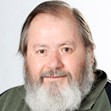 It is with great sadness that we report the sudden and untimely death of Professor Wayne Erskine who passed away in Darwin in late July 2017.
It is with great sadness that we report the sudden and untimely death of Professor Wayne Erskine who passed away in Darwin in late July 2017. Wayne graduated with a Doctor of Philosophy in Fluvial Geomorphology (1987) from the University of New South Wales, Australia. He held academic positions at the University of New South Wales, University of Newcastle – Ourimbah Campus and Charles Darwin University and, also, research scientist positions with New South Wales Department of Water Resources, New South Wales State Forest, Office of the Supervising Scientist (OSS), and the Environmental Institute of the Supervising Scientist (ERISS). He had recently been appointed as the sub-editor of Geographical Research. Wayne was a keen fisherman and spoke often of his obsession for everything related to freshwater science.
Wayne was an exceptionally productive and influential fluvial geomorphologist publishing over 230 peer reviewed international and national journal manuscripts, conference papers and book chapters. He supervised 35 post graduate students. Wayne had been a strong supporter of, and contributor to, ICCE activities since the mid-1980s and will be warmly remembered for his in depth and wide readership of the scientific literature which permitted him to engage in detail with all scientists on their work, his ability to produce high quality papers for the Red Book series, his extremely engaging and word perfect presentations on diverse subjects and increasingly on work bridging pure and applied science, and his capacity to ask incisive questions at conferences backed up by his broad, but in-depth, knowledge and understanding. He had recently been discussing the possibility of hosting a future ICCE meeting with the current committee. Wayne will be greatly missed and is survived by three children - Vanessa, Aaron, Jessica and his Mother Judith.
Professor Adrian Collins, President ICCE
Second IAHS Panta Rhei International Conference 2nd Announcement
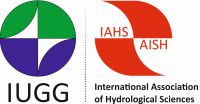 |
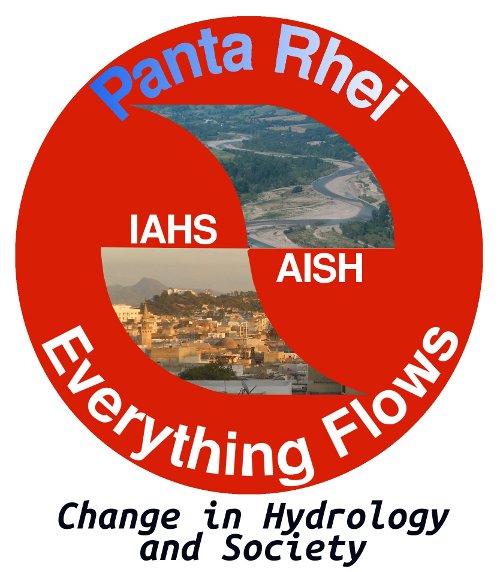 |
Water System Knowledge Innovation and its Practices in Developing Countries
November 20-22, 2017 Gorgan, Iran
This international conference aims to bring together scientists (in particular from developing countries) and various disciplines that share a common interest in addressing the challenges of understanding and managing water systems.
A special session will be held on the Caspian Sea water-related management challenges to provide a forum for more detailed discussion on an important water system and its dynamics. A one-day field trip will be organized to the southern coastal areas of the Caspian Sea and the nearby Hyrcanian forests.
The broad aims are to enhance the contribution of strategic scientific and technical research and innovation to the sustainable management of water systems, including rivers, groundwater and wetlands.
There are four main objectives for this conference:
(1) To understand major water system problems and their root causes particularly in developing countries in coupled nature-human systems;
(2) To demonstrate current hydrological knowledge of models, tools and case studies to deal with water system problems e.g. water scarcity, water-related disasters, groundwater depletion, water-related poverty and conflicts;
(3) To identify demand for hydrological innovation to meet the grand water system challenges particularly IWM under the severe climate change conditions as well as under unstable policy and management conditions; and
(4) To develop a multi-national and multi-disciplinary cooperation framework with a concrete working plan in order to provide capacity building, monitoring equipments, and free software packages and decision support systems for developing countries, and to expand Panta Rhei as well as IAHS through establishing national committees and regional networks and increasing members in these counties.
Registration fees and logistics
No registration fees will be charged, but participants are responsible for their own international flights. Conference organizers will arrange for accommodation and travelling within Iran.
Key deadlines
June 9, 2017 First announcement of the conference
August 14, 2017 Second announcement of the conference
September 8, 2017 Deadline for collecting submissions
October 31, 2017 Last announcement with detailed conference information
November 20-22, 2017 Conference and excursion
Further information is available in the Second Announcement
2017 International Hydrology Prize medalists
Congratulations to the recipients of the International Hydrology Prize (Dooge medal and Volker medal) for 2017!
THE 2017 INTERNATIONAL HYDROLOGY PRIZE MEDALISTS:
Dooge medal: Zbigniew Kundzewicz (Poland)
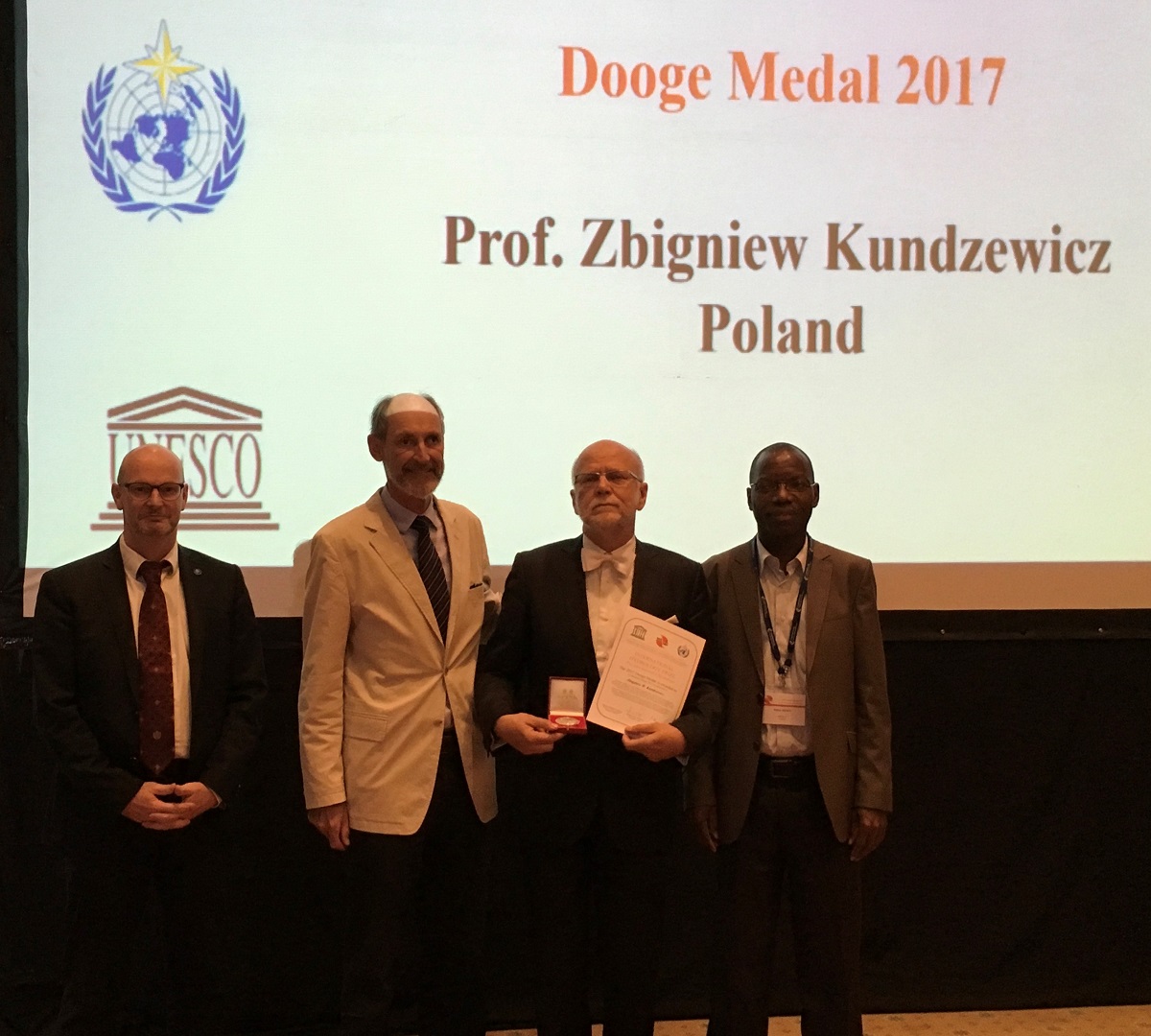
Left to right: Dominique Bérod (Chief WMO), Hubert Savenije (President IAHS), Zbigniew Kundzewicz (Dooge Medal Recipient), Abou Amani (Chief of Section HSS, UNESCO)
For the full citation and response see the IAHS webpage http://iahs.info/About-IAHS/Competition--Events/International-Hydrology-Prize/International-Hydrology-Prize-Winners/Z-Kundzewicz.do
Volker medal: Dan Rosbjerg (Denmark)
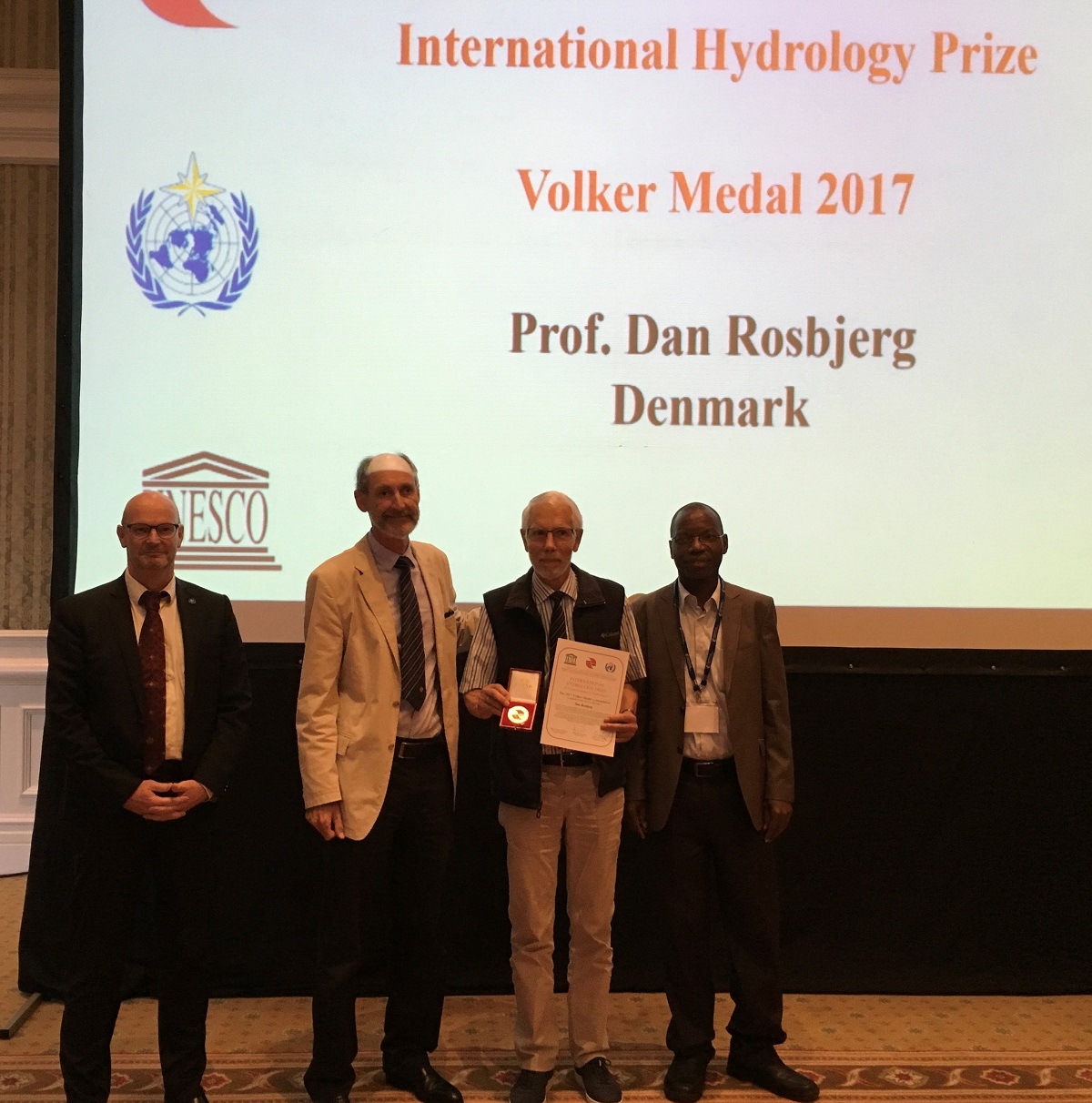
For the full citation and response see the IAHS webpage http://iahs.info/About-IAHS/Competition--Events/International-Hydrology-Prize/International-Hydrology-Prize-Winners/D-Rosbjerg.do
Awarded during the IAHS2017 Scientific Assembly in Port Elizabeth, South Africa (13th July 2017).
The International Hydrology Prize is awarded annually by IAHS, with UNESCO and WMO, to two people who have made an outstanding contribution to hydrological science.
Nominations for the Prize are made by National Committees to IAHS, National Committees to the UNESCO-IHP or National Hydrological Advisors to the WMO, and forwarded to the Secretary General of IAHS for consideration by the Nomination Committee. The Committee consists of the President and a Vice-President of IAHS and representatives of UNESCO and WMO.
Two medals are awarded under the International Hydrology Prize: the Dooge medal and the Volker medal. Both medals are intended to distinguish outstanding achievements by hydrological scientists but with a different focus. The Dooge medal is aimed at fundamental contributions to the science of hydrology, whereas the Volker medal is aimed at outstanding applications of hydrological science for the benefit of society at large.
2017 Tison Award Ceremony
The 2017 Tison award was presented to Mohammad Merheb during the IAHS 2017 Scientific Assembly in Port Elizabeth, South Africa.
For the paper:
Mohammad Merheb, Roger Moussa, Chadi Abdallah, François Colin, Charles Perrin & Nicolas Baghdadi (2016) Hydrological response characteristics of Mediterranean catchments at different time scales: a meta-analysis, Hydrological Sciences Journal, 61:14,2520-2539, DOI: 10.1080/02626667.2016.1140174
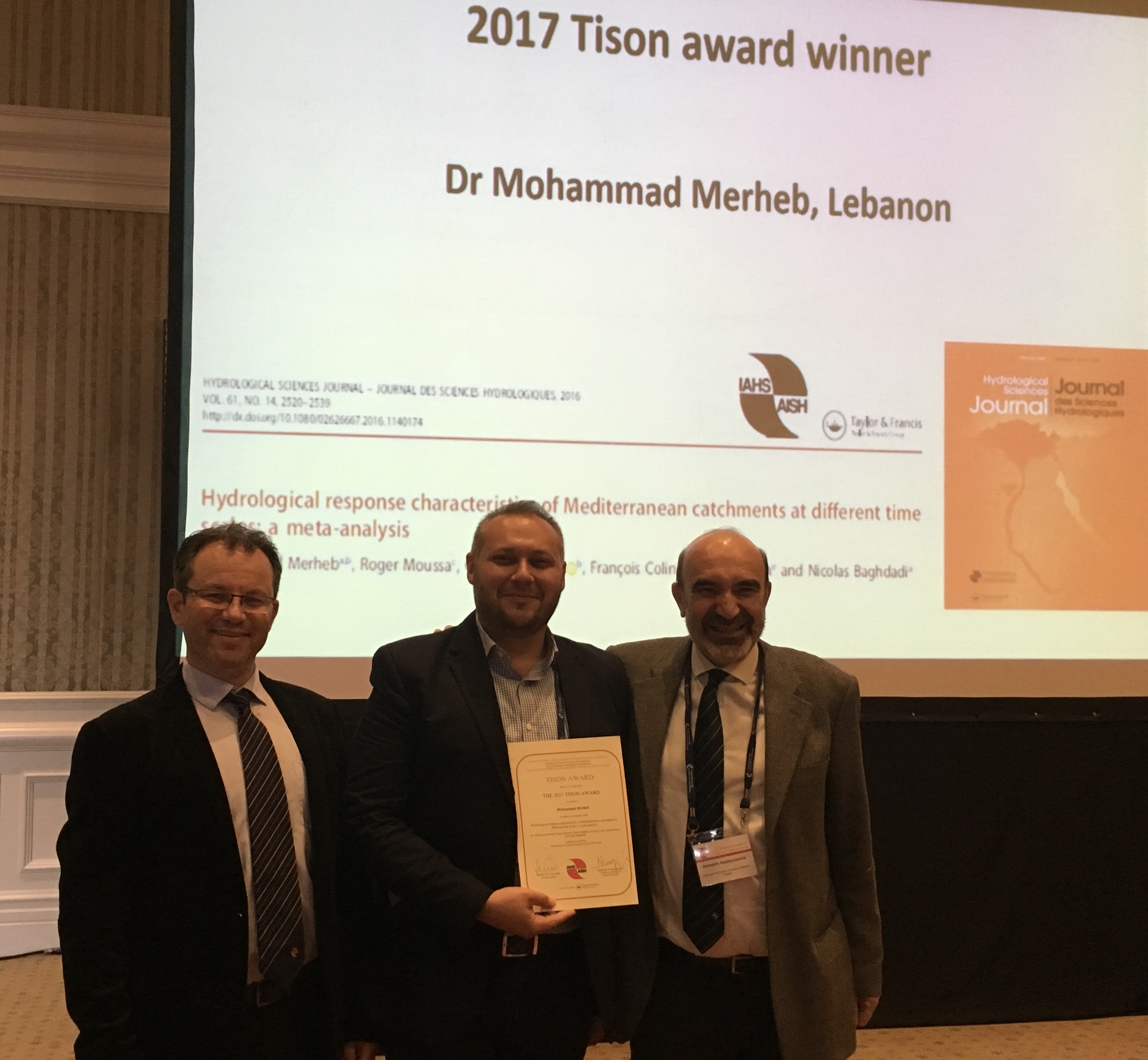
The paper is available open access: http://www.tandfonline.com/doi/full/10.1080/02626667.2016.1140174
The IAHS Tison Award, established in 1982, aims to promote excellence in research by young hydrologists. The Award is granted for an outstanding paper published by IAHS in a period of two years previous to the deadline for nominations.
For the full citation and response see the IAHS web page: http://iahs.info/About-IAHS/Competition--Events/Tison-Award/Tison-Award-winners/Mohammad-Merheb.do
IAHS 2017 Ultimate Frisbee Tournament
The first ten minutes of the game were heavily disputed between the two teams. Some time was indeed necessary to adapt to the unusual sandy and windy terrain conditions, as well as to the salty water. The SGHs team fast developed a stochastic model that could adapt to the wind gusts, as well as to the drop of wind, to dry and wet sandy land use, and to the rising Indian Ocean tide and even to waves. They consequently scored first, taking advantage of the changing conditions, which they are used to. This resulted into a fast growing score, up to 6-0 for SGHs.
Over confident with their score advantage, the Panta Rhei SHGs team decided that they had to also take advantage of their moto: “Everything flows”, which in that case was adapted to “Everything floats”. For this reason, they decided to throw the Frisbee into the ocean. To their surprise, Frisbees do not float very well and the one they threw disappeared, so the players had to use a new one.
The SUHs team, oppositely to the over-calibrated SGHs team, did not need calibration for this new Frisbee, so they began to score their first points: 6-2. However, the original Frisbee reappeared from the water and with this well-known Frisbee, the score went fast to 11-2 for the SGHs team.
It was time for the golden Frisbee, i.e. the last point that would decide upon the winners of the game. Again, the SUHs did not need calibration for this new rule and they scored fast, putting an end to this pleasant game, with a score of 11-3.
We are all waiting forward for a new game in Montréal in 2019.
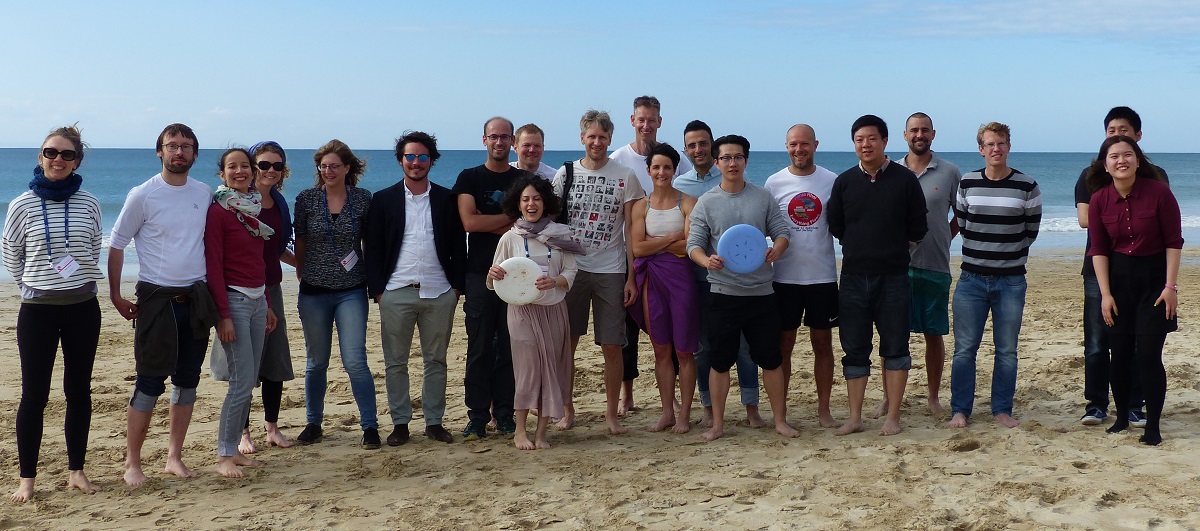
Thanks to all of the players of the Frisbee game (not all of them are on the picture): Samuel Monhard, Berny Bisselink, Giuliano di Baldassare, Alberto Viglione, Gil Mahé, Giuseppe Formetta, Shuya Liu, Tao Chen, Weifei Zheng, Wenpeng Wang, Valérie Borrell-Estumina, Sandra van Exter, David Milan, Corinna Abesser, Johan Strömqvist, Omen, Remko Nijzink and Guillaume Thirel.
More photos are available on the IAHS facebook page.
Panta Rhei at IAHS 2017 (Port Elizabeth, South Africa)
This e-news brings you the latest news from Panta Rhei at the IAHS Port Elizabeth Assembly.
New Panta Rhei Biennium 2017 – 2019
We are very pleased to announce that the IAHS Bureau has voted to accept the handover of the Panta Rhei leadership from the 2015 – 2017 Biennium to the 2017 – 2019 Biennium. This announcement was made to the participants of the IAHS Scientific Assembly in Port Elizabeth (South Africa) during the Plenary on 13 July. The new Panta Rhei leadership is as follows:Panta Rhei Chair 2017-2019:
· Giuliano di Baldassarre, Uppsala University, Sweden
Leadership Team 2017-2019:
· Veena Srinivasan, Ashoka Trust for Research in Ecology and the Environment, Bangalore
· Fuqiang Tian, Tsinghua University, Beijing
· Yasir Mohamed, UNESCO IHE, Netherlands
· Tobias Krueger, Humboldt University of Berlin, Germany
· Junguo Liu, South University of Science and Technology of China
· Amir AghaKouchack, University of California, Irvine, USA
· Heidi Kreibich, Helmholtz Centre Potsdam, Germany
· Tara Troy, Lehigh University, USA
Panta Rhei Meeting at Port Elizabeth
A Panta Rhei meeting took place on Wednesday 12 July at the IAHS 2017. The meeting was chaired by Giuliano Di Baldassarre. Hubert Savenjie introduced the event, which was then followed by three brief talks and a 45-minute debate.Alberto Montanari summarized the origins of Panta Rhei and the overarching research questions, Berit Arhemeir presented the potential of SWITCH-ON Virtual Water Science Lab IT to support scientific collaboration, and Junguo Liu showed some of the most recent activities with a focus on developing countries.
An open discussion was then facilitated by Giuliano Di Baldassarre. The debate aimed to get feedback on ongoing and future activities, and keep shaping together the Panta Rhei research agenda. There was a general consensus on the need to produce open databases and tools, support cooperation within the IAHS community, keep the focus on early career scientists, and connect with other research communities, including human geographers, behavioral economists, sociologists and political scientists. Various challenges were also discussed. Scientific challenges, such as the understanding of hydrological change in the Anthropocene, whereby humans are key drivers of change, and methodological challenges, including both opportunities and difficulties in collaborating and engaging with social scientists.
Panta Rhei and SWITCH-ON
A new partnership between Panta Rhei and the SWITCH-ON Virtual Water Science Lab, which we hope will assist Panta Rhei working groups to participate in joint projects. This new tool is launched at the IAHS website for data sharing and collaborative experiments: http://www.switch-on-vwsl.eu/Each working group can start thematic discussions in the Forum and also create protocols. The VWSL aims to facilitate collaboration despite of geographical distances, as well as transparency of computational workflows. We hope that these tools will serve the IAHS community to advance science and comparative hydrology through more efficient collaboration across the globe. The SWITCH-ON Virtual Water-Science Laboratory was demonstrated in the Poster Hall every day during coffee breaks and poster sessions at the IAHS 2017.
Panta Rhei Activities 2016 – 2017
Panta Rhei had a busy year during 2016 – 2017. One new working group was formed, “Comparative Study on the Co-Evolution of Coupled Human-Water Systems”, bringing the total number of groups to 32 (with a total of more than 400 members).More details of all our working groups, and the latest Panta Rhei News, can be found on our website at http://iahs.info/Commissions--W-Groups/Working-Groups/Panta-Rhei/
A dedicated Panta Rhei Day Workshop was held in Vienna, where we continued to build on Panta Rhei activities including a discussion of the best ways to energise your own working group! See here http://iahs.info/uploads/Panta%20Rhei/How%20to%20revitalise%20your%20Panta%20Rhei%20working%20group.pdf for a short summary.
Panta Rhei is creating an online map with overview information of working group projects and Panta Rhei members. Watch this space as we hope to release the first version by the end of 2017. We continue our ongoing opinion paper series in Hydrological Sciences Journal: you can find more information about the series here: http://iahs.info/News.do?news_id=201 .
Panta Rhei has organised conference sessions at EGU, AGU, and workshops in UK and China. The upcoming 2nd IAHS Panta Rhei International Workshop will be held in Iran in November.
For more details on all these activities will soon be available in the Panta Rhei annual report.
With kind regards,
Hilary McMillan: Panta Rhei Chair 2015 – 2017
Giuliano di Baldassarre: Panta Rhei Chair 2017 – 2019
SWITCH-ON Virtual Water-Science Laboratory
 IAHS are pleased to announce that the SWITCH-ON Virtual Water-Science Lab. is now available through the IAHS website (in the Panta Rhei section and the Links page). This Lab was developed by a group of IAHS researchers and will be demonstrated during the whole week of the IAHS 2017 Scientific Assembly in Port Elizabeth in July 2017 in the poster section of room B2. The project phase is ending and the Lab is now offered as a tool for the IAHS community and the working groups of Panta Rhei.
IAHS are pleased to announce that the SWITCH-ON Virtual Water-Science Lab. is now available through the IAHS website (in the Panta Rhei section and the Links page). This Lab was developed by a group of IAHS researchers and will be demonstrated during the whole week of the IAHS 2017 Scientific Assembly in Port Elizabeth in July 2017 in the poster section of room B2. The project phase is ending and the Lab is now offered as a tool for the IAHS community and the working groups of Panta Rhei.
SWITCH-ON is an EU-funded FP7 project with 15 partners across Europe (duration 2013 - 2017, grant agreement no. 603587). One main focus is share data, tools and computational scripts between scientists and research groups world-wide. The Lab also enable transparency and reproducibility of scientific experiments.
Suggestions for improvement to the Lab with the inclusion of more tools are highly appreciated. Please contact Berit Arheimer or Lorna Little.
About VWSL
Why use the Virtual Water Science Laboratory (VWSL) ?
The VWSL should facilitate collaboration and support reproducible experiments in water research. The goal is to overcome geographical distance for comparative hydrology and increase transparency when using computational tools in hydrological sciences. The VWSL gives access to open data through dedicated software tools for data search and upload, and helps creating protocols for joint experiments in the virtual environment. The SWITCH-ON VWSL will help you as a scientist with:
Cooperation around the world - helps you to connect with other scientists in comparative analyses and collaboration, as a mean to accelerate scientific advance in your research field.
Repeatability* of experiments – enables thorough review of a large variety of numerical experiments, which is a foundational principle in scientific research and will raise your standards.
New forms of scientific research – by using online ‘living’ protocols you can elaborate ideas incrementally with a large group of colleagues and share data, tools, models, etc. in open science.
More information can be found at http://www.switch-on-vwsl.eu/

2nd IAHS Panta Rhei International Workshop
The Second IAHS Panta Rhei International Workshop on
Water System Knowledge Innovation and its Practices in Developing Countries
November 20-22, 2017
Gorgan, Iran
The four main objectives for this workshop are:
(1) To understand major water system problems and their root causes particularly in developing countries in coupled nature-human systems;
(2) To demonstrate current hydrological knowledge of models, tools and case studies to deal with water system problems e.g. water scarcity, water-related disasters, groundwater depletion, water-related poverty and conflicts;
(3) To identify demand for hydrological innovation to meet the grand water system challenges particularly IWM under the severe climate change conditions as well as under unstable policy and management conditions; and
(4) To develop a multi-national and multi-disciplinary cooperation framework with a concrete working plan in order to provide capacity building, monitoring equipment, and free software packages and decision support systems for developing countries, and to expand Panta Rhei as well as IAHS through establishing national committees and regional networks and increasing members in these counties.
Workshop Information
8th International Water Resources Management Conference
Innovative Water Resources Management under Changing Environment – Understanding Interactions and Making Balance between Humankind and Nature
This conference, the eighth in the series of IWRM conferences organized by IAHS-ICWRS, is focused on the innovative and integrated management of water resources.
Conference themes
1. Assessment of available water resources at regional and basin scales
2. Ecological baseflow /Environmental flow to maintain the health of rivers and lakes
3. Spatiotemporal distribution of water resources availability
4. Water needs for a healthy society
5. Impact of climate change and human activities on water resources
6. Water resources allocation and management models
7. Interactions between water resources and ecosystem
8. Socio-hydrology as the basis of water resources management
9. Risk analysis for water resources systems, and
10. Related issues
Conference Flyer
For further information about registration, accommodation, abstract and paper submission, conference fees and programme, please visit the conference website: http://iwrm2018.bnu.edu.cn/
IUGG Publications: June e-journal
This informal newsletter is intended to keep IUGG Member National Committees informed about the activities of the IUGG Associations, and actions of the IUGG Secretariat. E-journals from the two most recent years are available in the news section of the IAHS website (http://iahs.info/News/IUGG-Newsletters.do ). Past issues are posted on the IUGG website (http://www.iugg.org/publications/ejournals/ ).
If you would like to subscribe for the monthly E-Journal, please contact the IUGG Secretariat
